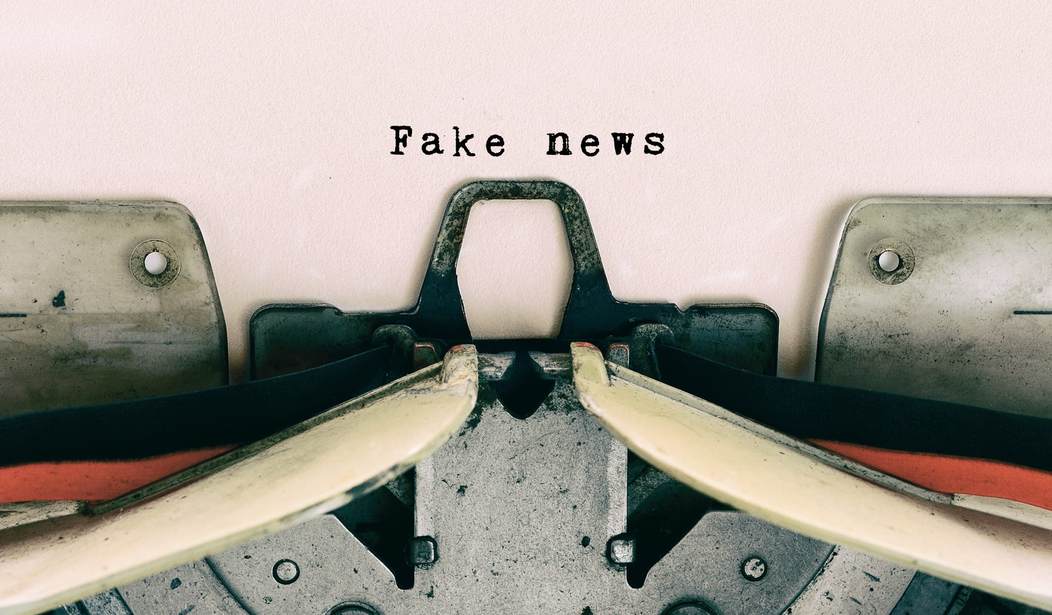See below for update from AFP Canada.
Facebook announced last year that they will be using third-party fact-checkers to root out “fake news” on their platform. At the time of the announcement, conservatives sounded the alarm about how some of the fact-checkers they’re using are left-wing hacks like PolitiFact and Snopes (who recently, with straight faces, fact-checked a piece of satire from The Babylon Bee).
A recent warning that accompanied an article I wrote for PJM highlights the fallibility of Facebook’s fact-checking program:

Why a Canadian outfit is fact-checking U.S. news is anyone’s guess, but they clearly flagged my article in error. [It was brought to my attention after this article was published that AFP Canada is part of France’s state-run Agence France-Presse, so let me rephrase that question: Why has Facebook chosen a state-run French news outlet to fact-check U.S. news?]
You can read the article in question here. Facebook deprioritized my article after AFP Canada reported this:
No, it is not illegal to take a shower and do laundry on the same day in California
While some media outlets did indeed report (more or less) falsely that California had made it illegal to shower and do laundry on the same day, I made no such claims. In fact, having seen other reporting making that claim (stretching the truth a bit, in my opinion) I conscientiously avoided making it. I merely laid out the facts about a typical family’s water usage and concluded that the 55-gallon-per-day water limit recently imposed on Californians “may” force them to choose between showering and doing laundry on the same day. Nevertheless, Facebook, relying on AFP’s article, apparently lumped mine in with those that stretched the truth a bit, even though the AFP article never mentioned PJ Media. They did, however, single out articles by Zero Hedge, Washington Times, and a local San Diego news station.
The article from AFP Canada made the following claims:
The new laws do set the following “standards” in future years for indoor residential water use:
- From 2022 to Jan. 1, 2025, the standard volume is 55 gallons per capita per day
- From Jan.1, 2025, this standard is reduced to 52.5 gallons per capita per day
- From Jan. 1, 2030, the standard is reduced to 50 gallons per capita per day
However keyword searches of both laws, found here and here show there is no mention of laundry nor having a shower.
I quoted the bill directly in my piece so there would be no confusion as to what was included in the new standards and when they would take effect:
The bill, until January 1, 2025, would establish 55 gallons per capita daily as the standard for indoor residential water use, beginning January 1, 2025, would establish the greater of 52.5 gallons per capita daily or a standard recommended by the department and the board as the standard for indoor residential water use, and beginning January 1, 2030, would establish the greater of 50 gallons per capita daily or a standard recommended by the department and the board as the standard for indoor residential water use. The bill would impose civil liability for a violation of an order or regulation issued pursuant to these provisions, as specified.
AFP:
The laws also make no mention of fining individuals for exceeding the standards. The laws state only that fines or penalties may be applied to “urban water suppliers”.
I wrote:
The [State Water Resources Control Board] would have authority over all water suppliers, imposing onerous reporting requirements on them to ensure they’re complying with the 20 percent reduction mandate, and imposing fines if they don’t.
[…]
Water providers face hefty fines if they’re found to be in violation of the law:
1) If the violation occurs in a critically dry year immediately preceded by two or more consecutive below normal, dry, or critically dry years or during a period for which the Governor has issued a proclamation of a state of emergency under the California Emergency Services Act (Chapter 7 (commencing with Section 8550) of Division 1 of Title 2 of the Government Code) based on drought conditions, ten thousand dollars ($10,000) for each day in which the violation occurs.
(2) For all violations other than those described in paragraph (1), one thousand dollars ($1,000) for each day in which the violation occurs.
AFP:
The articles in dispute also state that the provisions and penalties of these laws have already taken effect. However Governor Brown’s statement and the laws state they will begin in 2022.
See above where the text of the new law says it will take effect in 2025. (Who’s checking these fact-checkers?)
AFP:
Many of the articles in dispute cited an analysis here that an American uses on average 17 gallons of water and another 40 gallons for a load of laundry. Therefore, according to the analysis, people who do this and exceed the 55-gallon allotment in California will be breaking the law.
The analysis cited figures from www.home-water-works.org, a site developed by the Alliance for Water Efficiency, a nonprofit organization that promotes efficient water use.
However, the same site also states that there are water efficient devices, which means individuals can easily have a shower and do their laundry using far less than 55 gallons.
The analysis concluded that Americans on average use 80-100 gallons of water per day:
- A bath uses around 36 gallons of water
- A 10-minute shower uses 50 gallons
- Washing clothes takes 25-40 gallons of water, depending on the machine’s efficiency
- Toilets normally use 1.6 gallons per flush (if you’re using a low-flow model)
- Shaving, brushing your teeth, and washing your face take a gallon each
Using that information, I extrapolated out the following:
As you can see, it’s not difficult to use 55 gallons of water in the course of a normal day. California residents who opt for a shower will only be left with enough water to brush their teeth and perhaps flush the toilet a couple of times before they run afoul of the new state law.
In fact, during the 2016 primary, PolitiFact called Ted Cruz a liar because he dared to say that boys can’t be girls and vice versa during a debate about the transgender bathroom controversy. Capital Research explained:
PolitiFact ruled it objectively false to describe a person by his or her birth sex if that person identifies with another sex. The ruling came in response to an attack ad launched by then-Republican presidential candidate Ted Cruz against frontrunner Trump, who said he opposed the North Carolina law. On the famed “Truth-O-Meter,” PolitiFact determined that Cruz’s ad was “mostly false.” But not because it falsely accused Trump of anything. Rather, PolitiFact adopted a radical position in vogue in academia and declared, “it’s not accurate to say that transgender women are men.”
First, that content’s distribution is reduced. It will appear lower in News Feed, and will be accompanied by Related Articles from fact-checkers. If people try to share the content, they will be notified of the additional reporting. They will also be notified if content they have shared in the past has since been rated by a fact-checker.
Second, in order to more effectively fight false news, we also take action against Pages that share, and domains that publish, content which is rated “False.” Such Pages and domains will see their distribution reduced as the number of offenses increases. Their ability to monetize and advertise will be removed after repeated offenses. Over time, Pages and domains can restore their distribution and ability to monetize and advertise if they stop sharing false news.
Publishers who issue a correction or dispute a rating may contact the fact-checker. If their correction or dispute is successful, the strike against them will be eliminated. Note that simply deleting a post or removing a URL is not sufficient to eliminate the strike against the domain or Page.
Again, I ask, who’s checking up on the fact-checkers? Facebook’s response indicates that they are taking a hands-off approach. If there’s a dispute, your only recourse is to contact the fact-checkers and hope they do the right thing. (Incidentally, handing off responsibilities to third parties is what got Facebook in trouble with the Cambridge Analytica scandal. You’d think they’d have learned their lesson on what happens when a company shirks its responsibilities.)
Facebook is already under fire for picking winners in the news wars — deprioritizing news altogether and giving special considerations for MSM outlets — and conservatives are rightly concerned that processes already in place are ensuring that their content won’t be seen by the Facebook Community.
This incident highlights the dangers of letting the “Facebook Community Mob” and a bunch of allegedly “independent” fact-checkers (many of which lean left) determine what you see and don’t see. There’s clearly something wrong with the process Facebook is using if factual and well-sourced articles like mine get flagged. It doesn’t bode well for the future of conservative media.
Update Friday 1:57 p.m. EST: AFP Canada responded to my request for an explanation with the following:
The story was fact-checked because it was trending on Facebook in Canada.
The story was rated a mixture due to the following claim, which is made without evidence to support it: “California residents who opt for a shower will only be left with enough water to brush their teeth and perhaps flush the toilet a couple of times before they run afoul of the new state law.“
If the sentence is corrected, the mixture rating will be removed.
Sincerely,
AFP Fact check editors
Only I did supply evidence to support the claim (see above). It is looking more and more like they just don’t like the conclusions I drew based on the evidence. They don’t like that I called out the incompetence of California bureaucrats, but couldn’t say that, so they invented a reason to nitpick the article into oblivion. Very troubling.
Follow me on Twitter @pbolyard










Join the conversation as a VIP Member